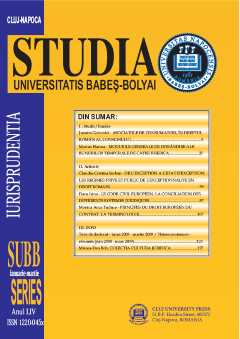DREPTUL LA UN REMEDIU EFECTIV
THE RIGHT TO AN EFFECTIVE REMEDY
Author(s): Cosmin Flavius CostaşSubject(s): Law, Constitution, Jurisprudence
Published by: Studia Universitatis Babes-Bolyai
Keywords: fair trial; reasonable time; effective remedy; art. 6 par. 1 ECHR; art. 13 ECHR; national mechanisms proposed as effective remedies; pilot judgments.
Summary/Abstract: The right to an effective remedy. In a nutshell, art. 6 par. 1 ECHR states that Contracting Parties shall ensure the right to a judgment within a reasonable time, as part of a fair trial, while art. 13 ECHR provides the justice seekers with the right to an effective remedy when they complain about the States' failure to comply with the obligations imposed on them by the Convention. As of 26 October 2000, following the judgement in the Polish case Kudla, the Court has linked these two rights and established that Contracting Parties shall provide effective remedies so that justice seekers can complain about the excessive length of procedures and either speed up the procedures or receive appropiate reddress for the breach of their right to a judgment within a reasonable time. In the last 12 years, the Court's case-law has significantly evolved. Most of the remedies proposed by the states have been analysed by the European judges in Strasbourg. The Court has clearly stated that it supports a combination of mechanisms designed to prevent the excessive length of national procedures and to repair the damage produced as a result of the failure to have the case expedited within a reasonable time. For those Contracting Parties that failed the European test, the Court has issued pilot judgments in order to guide them in the search of effective national remedies. However, at the time this study is put forward, some states are still looking for an adequate approach. The research that has generated this article focuses on the evolution of the Court's case-law, through a state-by-state analysis of the proposed mechanism that might be considered as effective remedies. Particular respect is paid to the changes of national regulations and the acknowledgment of such changes by the Court. Short references to those states that managed to keep themselves out of the effective remedies trouble are also made, underlining the judicial culture of a fair trial within a reasonable time. The aim of this study is also to provide some guidance for the Romanian legislators, as Romania has not yet designed preventive or compensatory mechanisms. Since the number of violations of the reasonable time requirement in the case of Romania is significant, it is the author's belief that the issue of a pilot judgment in the case of Romania shall be considered by the Court quite rapidly.
Journal: Studia Universitatis Babes Bolyai - Iurisprudentia
- Issue Year: 57/2012
- Issue No: 2
- Page Range: 150-197
- Page Count: 48
- Language: Romanian

